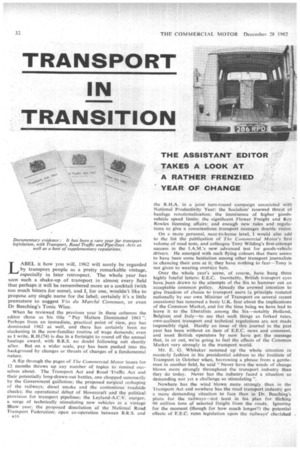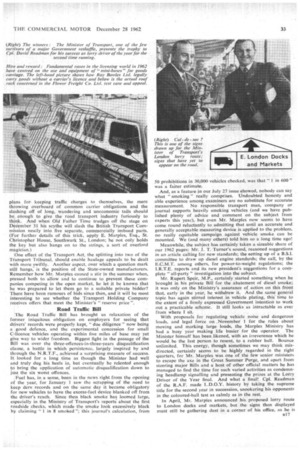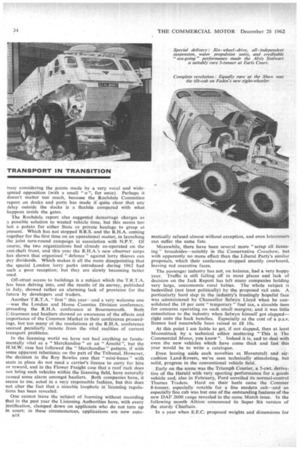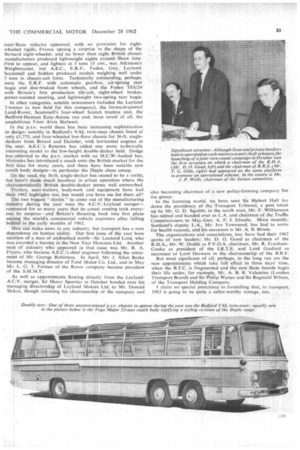TRANSPORT IN TRANSITION
Page 34

Page 35

Page 36

Page 37

If you've noticed an error in this article please click here to report it so we can fix it.
LABEL it how you will, 1962 will surely be regarded by transport people as a pretty remarkable vintage, especially in later retrospect. The whole year has • seen such a shake-up of transport in almost every field that perhaps it will be remembered more as a cocktail (with too much bitters for some), and I, for one, wouldn't like to propose any single name for the label; certainly it's a little premature to suggest Yin du Marche Common, or even Dr Beeching's Tonic Wine.
When he reviewed the previous year in these columns the editor chose as his title "Pay Matters Dominated 1961 ". Perhaps from an immediate, practical point of view, pay has dominated 1962 as well, and there has certainly been no slackening in the now-familiar routine of wage demands; even as I write, R.H.(74) is due in a fortnight to round off the annual haulage award, with B.R.S. no doubt following suit shortly after. But on a wider scale, pay has been pushed into the background by changes or threats of changes of a fundamental nature.
A flip through the pages of The Commercial Motor issues for 12 months throws up any number of topics to remind ourselves about. The Transport Act and Road -Traffic Act and their potentially long-drawn-out battles, one chopped summarily by the Government guillotine; the proposed surgical reshaping of the railways; diesel smoke and the contentious roadside checks; the operational debut of Hovercraft and the political provision for transport pipelines; the Leyland-A.C.V, merger; a surge of technically stimulating new vehicles in a vintage Show year; the proposed dissolution of the National Road Transport Federation: open co-operation between B.R.S. and
1316 the R.H.A. in a joint turn-round campaign associated with National Productivity Year; the Socialists' renewed threat of haulage renationalization; the imminence of higher goodsvehicle speed limits; the significant Flower Freight and Roy Bowles licensing affairs: and enough new rules and regulations to give a conscientious transport manager double vision.
On a more personal, near-to-home level, I would also add to the list the publication of The Commercial Motor's first volume of road tests, and colleague Tony Wilding's first-attempt success in the I.A.M.'s new advanced test for goods-vehicle drivers. He emerged with such flying colours that there seems to have been some hesitation among other transport journalists in chancing their arm at it; they have nothing to fear—Tony is not given to wearing oversize hats.
Over the whole year's scene, of course, have hung three highly fateful letters: E.E.C. Inevitably, British transport eyes have ,been drawn to the attempts of the Six to hammer out an acceptable common policy. Already the avowed intention to give freedom of choice to transport users (a principle restated nationally by our own Minister of Transport on several recent occasions) has removed a basic U.K. fear about the implications of the Common Market, and for the time being we have had to leave it to the liberalists among the Six—notably Holland, Belgium and Italy—to see that such things as forked rates, own-account transport and technical regulations are not made impossibly rigid. Hardly an issue of this journal in the past year has been without an item of E.E.C. news and comment, and most British operators by now have got the message that, in or out, we're going to feel the effects of the Common Market very strongly in the transport world.
Mr. E. G. Whitaker summed up the whole situation in masterly fashion in his presidential address to the Institute of Transport in October when, borrowing a phrase from a gentleman in another field, he said "Never have the winds of change blown more strongly throughout the transport industry than they do today. Never has the industry faced a situation so demanding nor yet a challenge so stimulating ".
Nowhere has the wind blown more strongly than in the Transport Act and nowhere has the road transport industry got a more demanding situation to face than in Dr. Beeching's plans for the railways—not least in his plan for filching 90 million tons of selected freight from the roads. Ignoring for the moment (though for how much longer?) the potential effects of E.E.C. rates legislation upon the railways' cherished . plans for keeping traffic charges to themselves, the mere throwing overboard of common carrier obligations and the slashing off of long, wandering and uneconomic tails should be enough to give the road transport industry furiously to think. And when Old Father Time trudges off the stage on December 31 his scythe will slash the British Transport Commission neatly into five separate, commercially imbued parts. (For further details of this trick, apply E. Marples, Esq., St. Christopher House, Southwark St., London; he not only holds the key but also hangs on to the strings, a sort of overlord magician.) One effect of the Transport Act, the splitting into two of the Transport Tribunal, should enable haulage appeals to be dealt with more swiftly. Another aspect, over which a question mark still hangs, is the position of the State-owned manufacturers. Remember how Mr. Marples caused a stir in the summer when, pressed both to allow and to continue to prevent these companies competing in the open market, he let it be known that he was prepared to let them go to a suitable private bidder? There have been rumours of bids since then, and it will be most interesting to see whether the Transport Holding Company receives offers that meet the Minister's "reserve price ".
Road Traffic Bill
The Road Traffic Bill has brought us relaxation of the former iniquitous obligation on employers for seeing that drivers' records were properly kept, "due diligence" now being a good defence, and the experimental concession for small C-licence vehicles operating within five miles of base may yet give way to wider freedom. Biggest fight in the passage of the Bill was over the three-offences-in-three-years disqualification clause, a battle in which persistence, largely inspired by and through the N.R.T.F., achieved a surprising measure of suc.cess. It looked for a long time as though the Minister had well and truly dug his heels in, but eventually he relented enough to bring the application of automatic disqualification down to just the six worst offences.
Fuel has, in a sense, been in the news right from the opening of the year, for January 1 saw the scrapping of the need to keep derv, records and on the same day it became obligatory for new vehicles to have the excess-fuel device blanked off from the driver's reach. Since then black smoke has loomed large, especially in the Ministry of Transport's reports about the first roadside checks, which made the smoke look excessively black by claiming " I in 8 smoked "; this journal's calculation, from 50 prohibitions in 30,000 vehicles checked, was that "1 in 600" was a fairer estimate.
And, as a feature in our July 27 issue showed, nobody can say what " smoking " really comprises. undoubted honesty and able experience among examiners are no substitute for accurate measurement. No responsible transport man, company Or journal supports heavily smoking vehicles (and we have published plenty of advice and comment on the subject from experts this year), but even Mr. Marples now seems to have come round reluctantly to admitting that until an accurate and generally acceptable measuring device is applied to the problem, no really equitable campaign against vehicle smoke can be mounted. We (and many others) told him so a long time ago!
Meanwhile, the subject has certainly taken a sizeable share of our 1962 pages: Mr. J. T. Turner's sound, reasoned suggestions in an article calling for new standards; the setting up of a B.S.I. committee to draw up diesel engine standards; the call, by the E.C.M.T. among others, for power-to-weight regulations; the 1.R.T.E. reports and its new president's suggestions for a complete " all-party " investigation into the subject.
Mr. Rupert Speir, M.P., certainly started something when he brought in his private Bill for the abatement of diesel smoke; it was only on the Ministry's assurance of action on this front that, early in the year, he withdrew it. And the same general topic has again stirred interest in vehicle plating, thistime to the extent of a firmly expressed Government intention to work out a practicable scheme. It still looks as intractable as ever from where I sit.
With proposals for regulating vehicle noise and dangerous loads, and legal force on ,November 1 for the rules about moving and marking large loads, the Marples Ministry has had a busy year making life busier for the operator. The Minister himself has been likened, with an irreverence which he would be the last person to resent, to a rubber ball. Bounce unlimited. This energy, though sometimes we may think misdirected, certainly seems to be highly ,regarded in the right quarters, for Mr. Marples was one of the few senior ministers to escape the axe in the Great Summer Purge, and apart from steering major Bills and a host of other official matters he has managed to find the time for such varied activities as condemning headlamp. signalling and presenting the prizes at the Lorry Driver of the Year final. And what a final! Cpl. Readman of the R.A.F. made L.D.O.Y. history by taking the supreme title for the second year in succession, snookering his opponents in the coloured-ball test as calmly as in the rest.
In April, Mr. Marples announced his proposed lorry route to London docks and markets, but the signs then displayed must still be gathering dust in a corner of his office, as he is Bi 7
busy considering the points made by a very vocal and widespread opposition (with a small "o ", for once). Perhaps it doesn't matter too much, because the Rochdale Committee report on docks and ports has made it quite clear that any delay outside the docks is a fleabite compared with what happens inside the gates.
The Rochdale report also suggested demurrage charges as a possible solution to wasted vehicle time, but this seems too hot a potato for either State or private haulage to grasp at present. Which has not stopped B.R.S. and the R.H.A. coming together for the first time on an operational matter, in launching the joint turn-round campaign in association with N.P.Y. Of course, the two organizations had already co-operated on the anti-theft front, and this year the R.H.A.'s new observer corps has shown that organized. " defence' against lorry thieves can pay dividends. Which makes it all the more disappointing that the special London lorry parks introduced during 1962 had such a poor reception; but they are slowly becoming better used.
Off-street access to buildings is a subject which the T.R.T.A. has been delving into, and the results of its survey, published in July, showed rather an alarming lack of provision for the future by developers and traders.
Another T.R.T.A. " first " this year—and a very welcome one —was the London and Home Counties Division conference, preceding the R.H.A. conference at Bournemouth. Both C-licensees and hauliers showed an awareness of the effects and importance of the Common Market in their conference proceedings, but too many of the resolutions at the R.H.A. conference seemed peculiarly remote from the vital realities of current transport problems.
In the licensing world we have not had anything so fundamentally vital as a " Merchandise" or an "Arnold ", but the H.M.W. case has followed the " Merchandise" pattern, if with some apparent reluctance on the part of the Tribunal. However, the decision in the Roy Bowles case that " mini-buses " with seats in place do not need a carrier's licence to carry for hire or reward, and in the Flower Freight case that a roof rack does not bring such vehicles within the licensing field, have naturally caused some alarm amongst hauliers. Both companies have, it seems to me, acted in a very responsible fashion, but this does not alter the fact that a sizeable loophole in licensing regulations has been revealed.
One cannot leave the subject of licensing without recording that in the past year the Licensing Authorities have, with every justification, clamped down on applicants who do not turn up in court; in these circumstances, applications are now auto s I matically refused almost without exception, and even latecomers can suffer the same fate.
Meanwhile, there have been several more "scrap all licensing" broadsides—notably in the Conservative Crossbow, but with apparently no more effect than the Liberal Party's similar proposals, which their conference dropped smartly overboard, leaving red executive faces.
The passenger industry has not, on balance, had a very happy year. Traffic is still falling off in most places and lack of decision on the Jack Report has left many companies holding very large, uneconomic rural babies. The whole subject is bedevilled (not least politically) by the proposed rail cuts. A particularly hard slap in the industry's trustingly hopeful face was administered by Chancellor Selwyn Lloyd' when he consolidated the 10 per cent " temporary " fuel tax, a sizeable item for concerns operating on such small margins; and it was little consolation to the industry when Selwyn himself got slapped— right onto the back benches. Especially as the cost of a p.s.v. licence had meanwhile been raised to £8 10s.
At this point I am liable to get, if not slapped, then at least Moonstruck by a technical editor muttering "This is The Commercial Motor, you know ". Indeed it is, and to deal with even the new vehicles which have come thick and fast this year would be to write a catalogue.
Even leaving aside such novelties as Hovercraft and aircushion Land-Rovers, we've seen technically stimulating, but solid, progress in the conventional vehicle field.
Early on the scene was the Triumph Courier, a 5-ewt. derivative of the Herald with very sporting performance for a goods vehicle and, also in February. Ford unveiled its normal-control Thames Traders. Hard on their heels came the Cornmer 8-tonner, especially notable for a fine modern cab—and an especially fine cab was but one of the outstanding features of the new DAF 2600 range revealed in the same March issue. In the following month •Albion announced its Super Six version of the sturdy' Chieftain.
In a year when E.E.C. proposed weights and dimensions for
inter-State vehicles appeared, with no provisibn for eightwheeled rigids, France sprang a. surprise in the shape of the Bernard eight-wheeler, and no fewer than eight British chassis manufacturers produced lightweight eights around 'Show, time: First to appear, and lightest at 5 tons 15 cwt., was Atkinson's Weightmaster, but A.E.C., E.R.F., Foden, Guy, Leyland. Scammell and Seddon produced models weighing Well under 7 tons in chassis-cab form. Technically outstanding, perhaps, were the E.R.F. with automatic gearbox, air-Sprung rear bogie and disc-braked front wheels, and the Foden TE6/24 with Britain's first production. tilt-cab, eight-wheel brakes, power-assisted steering, and lightweight two-spring rear bogie.
In other categories, notable newcomers included the Leyland 2-tonner (a new field for this company), the forward-control Land-Rover, Scammell's four-wheel Scarab tractive unit, the Bedford-Hawson Easy-Access. Van and, most novel of all, the amphibious 5-ton Alvis Stalwart.
In the p.s.v world there has been increasing sophistication in design: notably in Bedford's VAL twin-steer.chassis listed at only £1,775, and four-wheeled low-floor chassis for 36-ft. singledeckers from Bristol and Daimler, with horizontal engines at the rear. A.E.C.'s Renown has added one more technically interesting model to the low-height double-decker field. Dodge has returned to the p.s.v. market with an M.C.W.-bodied bus, Mercedes has introduced a coach onto the British market for the first time for many years, and there have been notable new coach body designs—in particular the Duple clean sweep.
On the road, the 36-ft. single-decker has ceased to be a rarity, hut hasn't made Much headway in urban operation where the characteristically British double-decker seems well entrenched.
Trailers, semi-trailers, • bodywork and equipment have had their 1962 highlights too, but would you have me list them all?
The two biggest " stories " to come out of the manufacturing industry during the year were the A.C.V.-Leyland merger— rumoured for so many years that its actual coming took everyone by surprise—and Britain's thrusting back into first place among the world's commercial vehicle exporters after falling behind in the early months of 1962.
Men can make news in any industry, but transport has a rare dependence on human ability. Otir first issue of the year bore mention of a man of undoubted worth—Sir Leonard Lord, who was awarded a barony in the New Year Honours List. Another man of industry who appeared in that issue was Mr. R. A.
Fryars, who became A.E.C.'s chief engineer following the retirement of Mr. George Robinson. In April, Mr. 1. Allen Barke became managing director of Ford Motor Co. Ltd., and in May Mr. L. G. T. Farmer of the Rover company became president of the S.M.M.T.
As well as appointments flowing directly from the LeylandA.C.V. merger, Sir Henry Spurrier in October handed over his
managing directorship of Leyland Motors Ltd. to Mr. Donald Stokes, though retaining his chairmanship of the company and
also becoming chairman of a new policy-forming company for the group. In the licensing world, we have seen Sir Hubert Hull lay down the presidency of the Transport Tribunal, a post taken up by Mr. G. D. Squibb; in the north west, Mr. F. Williamson has retired and handed over as L.A. and chairman of the Traffic Commissioners to Maj.-Gen. A. F. J. Elmslie. More recently, Scotland's deputy L.A., Mr. Ivo Townsend, has had to retire for health reasons, and his successor is Mr. A. B. Birnie.
The organizations and 'associations, too, have had their 1962 quota of new leaders: Mr. D. 0. Good as chairman of the R.H.A., Mr. W. Dodds as P.V.O.A. chairman, Mr. R. GreshamCooke as president of the I.R.T.E. and Lord Gosford as successor to Lord Derwent in the chairmanship of the B:R.F.
But most significant of all, perhaps, in the long run are the new appointments which take full effect in three days' time, when the -B.T.C. is fragmented and the new State boards begin their life under, for example, Mr. A. B. B. Valentine (London Transport Board) and Sir Philip Warter and Sir Reginald Wilson, of the Transport Holding Company.
I claim no special prescience in foretelling that, in transport, 1963 is going to be quite a cellar-worthy vintage, too.




















































































